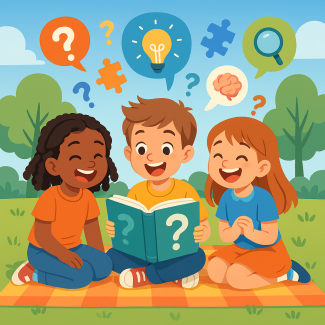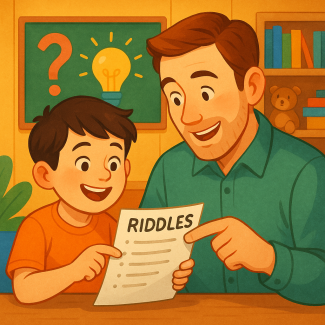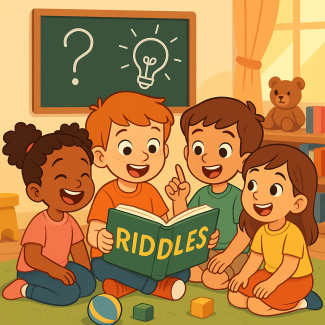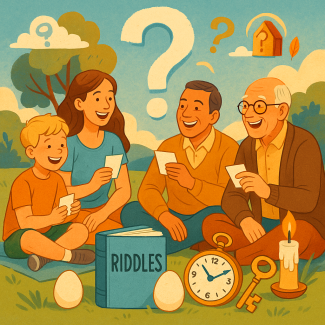
Fun and Simple Riddles to Spark Young Minds
Why Easy Riddles Are Great for Beginners
Riddles have long been used as a tool to entertain, challenge, and educate. For beginners, especially children or those new to the world of word puzzles, easy riddles with answers offer the perfect introduction. These clever questions help develop critical thinking, enhance language skills, and promote problem-solving in a fun and engaging way.
What makes riddles particularly useful for younger audiences or novice solvers is their simplicity and the immediate feedback offered by the answers. Whether you're a parent looking for an educational activity or a teacher seeking classroom resources, having a well-curated list of beginner-friendly riddles can be invaluable.
Benefits of Solving Riddles for Kids and Beginners
Cognitive Development and Creativity
Solving riddles boosts cognitive skills such as comprehension, memory, and logical reasoning. Beginners learn to identify patterns, play with words, and make connections between ideas, fostering creative thinking.
Improved Language and Vocabulary
Engaging with riddles introduces new words and phrases in a memorable context. This helps build a broader vocabulary and improves understanding of language nuances, idioms, and metaphors.
Encouraging Confidence and Social Interaction
Successfully solving a riddle provides a sense of achievement. This can boost self-esteem and encourage more participation in group settings like classrooms or family gatherings.
How to Use Easy Riddles Effectively
Fun Icebreakers
Use riddles at the start of lessons, meetings, or parties to break the ice and set a positive tone.
Family Bonding Time
Incorporate riddles into family game nights to spark laughter and thoughtful discussions among children and adults alike.
Classroom Engagement
Teachers can use riddles as warm-up exercises or to reinforce lessons in a playful way.
Top 10 Easy Riddles with Answers for Beginners
Here is a carefully selected list of 10 beginner-friendly riddles designed to challenge the mind without overwhelming. Each riddle includes a clear and clever answer.
1. What has to be broken before you can use it?
Answer: An egg.
2. I'm tall when I'm young, and I'm short when I'm old. What am I?
Answer: A candle.
3. What can you catch but not throw?
Answer: A cold.
4. What has a head and a tail but no body?
Answer: A coin.
5. What has hands but can’t clap?
Answer: A clock.
6. What has one eye but can’t see?
Answer: A needle.
7. What gets wetter as it dries?
Answer: A towel.
8. What goes up but never comes down?
Answer: Your age.
9. What kind of band never plays music?
Answer: A rubber band.
10. What has many keys but can’t open a single lock?
Answer: A piano.
Tips for Teaching Riddles to Beginners
Use Visual Aids
Adding illustrations or props can make riddles more understandable and appealing for visual learners.
Start with Guided Riddles
Provide hints or multiple choice options for younger kids or absolute beginners to ease them into problem-solving.
Encourage Creative Thinking
Let beginners create their own simple riddles. This fosters imagination and gives insight into how riddles work structurally.
Categories of Easy Riddles to Explore
Animal Riddles
These riddles involve creatures big and small, offering fun facts and logic-based clues.
- What animal is always at a baseball game? A bat.
- What do you call an alligator in a vest? An investigator.
Object Riddles
These focus on common household or classroom items that children are familiar with.
- I have four legs but no feet. What am I? A table.
- You use me when it’s raining. I go up and keep you dry. What am I? An umbrella.
Food Riddles
Tasty and relatable, food riddles are great for connecting with everyday experiences.
- I’m orange and I sound like a parrot. What am I? A carrot.
- What kind of cup doesn’t hold water? A cupcake.
Nature Riddles
These connect kids with the natural world, enhancing environmental awareness through curiosity.
- I fall but I never rise. What am I? Rain.
- I shine during the day and disappear at night. What am I? The sun.
Common Mistakes Beginners Make with Riddles
Overthinking
Beginners often assume the answer must be complicated. Remind them that riddles often rely on simple logic or wordplay.
Taking Questions Literally
Understanding that riddles play with meanings can help beginners relax and approach the riddle with a creative mindset.
Rushing to Answer
Encourage kids to read the riddle slowly, think critically, and explore different angles.
How to Create Your Own Easy Riddles
Creating riddles can be as fun as solving them. Here’s a basic structure to guide beginners:
- Choose a topic: An animal, object, or concept.
- Think of a unique feature: What’s special or unusual about it?
- Craft a question: Use metaphor, comparison, or a pun.
- Test it out: Ask others if they find it fun and solvable.
Example:
- I have teeth but I don’t bite. What am I? A comb.
Games and Activities Using Riddles
Riddle Relay
Create teams and let them solve a series of riddles in sequence. The first team to finish wins.
Daily Riddle Challenge
Introduce a “Riddle of the Day” at home or in class. Offer small rewards to keep motivation high.
Riddle Jar
Write riddles on slips of paper and keep them in a jar. Draw one each day for a fun challenge.
Final Thoughts on Using Riddles for Learning and Fun
Easy riddles are not just about laughs—they’re an accessible tool for nurturing curiosity and growth. Whether used in classrooms, at home, or during play, riddles offer more than amusement. They cultivate imagination, intellect, and interpersonal skills in subtle but powerful ways.
By incorporating beginner riddles into everyday activities, you provide a valuable opportunity for kids and newcomers to develop confidence, have fun, and see language from a fresh perspective.
Whether you’re a parent, teacher, or curious learner, keeping a few riddles up your sleeve is always a great idea.
And remember: The simpler the riddle, the more room there is for discovery.
Let the riddles begin!





